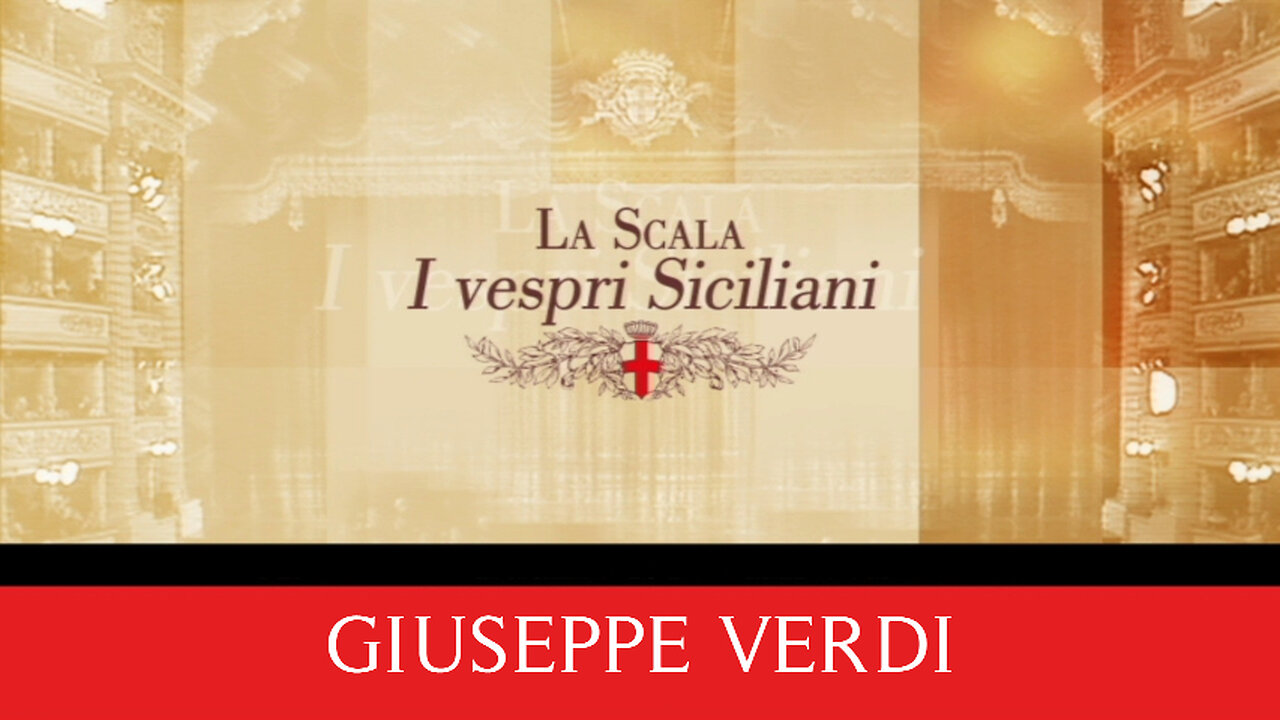Premium Only Content

Verdi: I Vespri Siciliani | Zancanaro, Furlanetto, Studer, Merritt - Mutti (La Scala 1989 - ACT 1&2)
Composer: Giuseppe Verdi
Librettist: Eugène Scribe
Premiere: 13 June 1855, Paris (Opéra)
Language: Italian
Translation: English Subtitles (Hardcoded)
Act 3: https://rumble.com/v4tuo9k-verdi-i-vespri-siciliani-zancanaro-furlanetto-studer-merritt-mutti-la-scala.html
I vespri siciliani ("The Sicilian Vespers") is a five-act Italian grand opera originally written in French for the Paris Opéra by the Italian romantic composer Giuseppe Verdi and translated into Italian shortly after its premiere in June 1855. Under its original title, Les vêpres siciliennes, the libretto was prepared by Eugène Scribe and Charles Duveyrier from their work Le duc d'Albe, which was written in 1838 and offered to Halévy and Donizetti before Verdi agreed to set it to music in 1854. Today the opera is performed both in the original French and (rather more frequently) in its post-1861 Italian version as I vespri siciliani. In Italy, this version, along with the ballet, was first performed at the Teatro Regio in Parma on 26 December 1855.
The action takes place in Sicily, the uprising of the Italian people against the French conquerors. The story is based on a historical event, the Sicilian Vespers of 1282, using material drawn from the medieval Sicilian tract Lu rebellamentu di Sichilia, which is a Sicilian historical chronicle of the War of the Vespers written around 1290.
Cast & Characters:
Guido de Montfort - Giorgio Zancanaro
Giovanni di Procida - Ferrucco Furlanetto
Arrigo - Chris Merrit
Princess Helena - Cheril Studer
Comte de Vaudemont - Francesco Musinu
Sir de Bethune - Enzo Capuano
Danieli - Ernesto Gavazzi
Ninetta - Gloria Banditelli
Tebaldo - Paolo Barbancini
Roberto - Marco Cingari
The Orchestra, Choir and Ballet of Teatro alla Scala
Concertmaster & Conductor: Riccardo Muti
Chorus Master: Giulio Bertola
Stage Director, Scenes and Costumes: Pier Luigi Pizzi
Soloist Dancer: Carla Fracci (Prima Ballerina of La Scala)
Choreography: Micha Van Hoecke
I Vespri Siciliani Synopsis: Place & Time - Palermo, Italy, 1282
Act I - Palermo's main square
Tebaldo, Roberto, and other French soldiers have gathered in front of the Governor's palace. As they offer a toast to their homeland, they are observed by the local Sicilians, unhappy with the occupation. Elena enters dressed in mourning for her executed brother. Somewhat drunk, Roberto demands that she sing and she calmly agrees. Her song, about the perils of seamen and God's cry of "let dangers be scorned", (Deh! tu calma, o Dio possente / "Viens à nous, Dieu tutélaire" / "Pray, O mighty God, calm with thy smile both sky and sea"), only incites the Sicilians to rebellion against the occupiers. When the governor, Monteforte, enters the crowd calms down. Then Arrigo announces that he has been released from prison. Alone with Arrigo, Montforte offers him a position with the French as long as he stays away from Elena. He refuses, and immediately follows Elena into the palace.
Act II - Beside the sea
Procida lands on the shore from a small fishing boat. It is clear that he is returning from exile and he expresses his joy at returning to his native land and city: O tu Palermo / "Et toi, Palerme" / "O thou Palermo, adored land...". He is surrounded by Manfredo and other companions and he quickly orders his men to bring Elena and Arrigo to him (Nell'ombra e nel silenzio / "Dans l'ombre et le silence"/ "In darkness and in silence"). The three make plans for an uprising during the impending festivities leading to the marriages of a group of young people. After Procida leaves, Elena asks Arrigo what reward he seeks. Swearing that he will avenge her brother's death, he asks for nothing but her love.
Bethune arrives with an invitation from Monteforte to attend a ball. Arrigo refuses and is arrested and dragged off. Led by Roberto, a group of French soldiers arrive and Procida returns and sees that it is too late to save Arrigo, since the young people have come into the square and have begun to dance. As the dance becomes more lively, Roberto signals to his men, who seize many of the young women, dragging them off in spite of the protests of the young Sicilian men. The dejected young men witness a passing boat filled with French nobles and Sicilian women, all bound for the ball. Procida and others determine to gain entrance to the ball and seek their revenge.
-
 LIVE
LIVE
barstoolsports
6 hours agoOld Dog Bites Back | Surviving Barstool S4 Ep. 9
10,586 watching -
 LIVE
LIVE
Right Side Broadcasting Network
7 days agoLIVE: TPUSA's America Fest Conference: Day One - 12/19/24
7,612 watching -
 LIVE
LIVE
Roseanne Barr
3 hours ago $3.12 earned"Ain't Nobody Good" with Jesse Lee Peterson | The Roseanne Barr Podcast #79
2,697 watching -

The StoneZONE with Roger Stone
52 minutes agoTrump Should Sue Billionaire Governor JB Pritzker for Calling Him a Rapist | The StoneZONE
3.72K -
 LIVE
LIVE
LittleSaltyBear
2 hours agoNecromancing Path of Exile 2 4K
258 watching -
 LIVE
LIVE
Akademiks
2 hours agoJay Z War against Diddy Accuser Lawyer GOES CRAZY! Lil Baby Speaks OUT! Cardi v Offset? Bhad Bhabie?
4,265 watching -
 LIVE
LIVE
Josh Pate's College Football Show
3 hours agoCFP Changes Coming | Transfer Portal Intel | Games Of The Year | Head Coaches Set To Elevate
53 watching -
 1:21:17
1:21:17
Donald Trump Jr.
6 hours agoWhat are These Mystery Drones? Plus Inside the Swamp’s CR. Interview with Lue Elizondo | TRIGGERED Ep.200
82.6K91 -
 37:54
37:54
Kimberly Guilfoyle
6 hours agoAmerica is Healing, Plus Fani Willis Disqualified, Live with Shemane Nugent & Mike Davis | Ep. 182
62.2K38 -
 7:38
7:38
Game On!
3 hours ago $0.29 earnedThe picks you need for Thursday Night Football!
4.97K